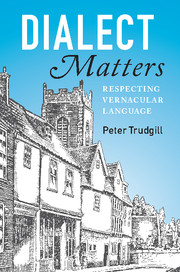Book contents
- Frontmatter
- Dedication
- Epigraph
- Contents
- Foreword
- Acknowledgements
- Map
- Themes
- 1 History: how things came to be this way
- 2 Prescriptivism and other useless pastimes
- 3 Language change: observing and accepting it
- 4 What is happening to words?
- 5 Languages and dialects in contact and conflict
- 6 Respecting English grammar
- 7 Respecting ordinary language
- 8 Sounds and fury
- 9 Respecting local speech
- 10 Grammar: the wonder of it all
- 11 More about words
- 12 Origins
- 13 Accent rules
- 14 Respecting names
- Postscript
- Index
6 - Respecting English grammar
Published online by Cambridge University Press: 05 August 2016
- Frontmatter
- Dedication
- Epigraph
- Contents
- Foreword
- Acknowledgements
- Map
- Themes
- 1 History: how things came to be this way
- 2 Prescriptivism and other useless pastimes
- 3 Language change: observing and accepting it
- 4 What is happening to words?
- 5 Languages and dialects in contact and conflict
- 6 Respecting English grammar
- 7 Respecting ordinary language
- 8 Sounds and fury
- 9 Respecting local speech
- 10 Grammar: the wonder of it all
- 11 More about words
- 12 Origins
- 13 Accent rules
- 14 Respecting names
- Postscript
- Index
Summary
In this section, I continue with the descriptive, anti-prescriptivist theme, arguing that all dialects have grammatical rules and structures, and that no one dialect is more “correct” than any other, nor grammatically superior to any other.
You done it, did you?
The word grammar has scary associations for many people; but there is really nothing to feel frightened about. We all use grammar all the time. You cannot speak without it. With no grammar, a language would not be a language. Think of the important difference between Norwich beat Ipswich and Ipswich beat Norwich: that's grammar. All languages and dialects have grammar, and the Norfolk dialect is no exception – we may “do different”, but we're not that different!
Most of the grammatical rules of the Norfolk dialect are the same as those in other English dialects. All types of English agree that adjectives come before nouns – unlike in French. There is a grammatical rule of English which allows the red car but not the car red. Everyone knows that, even if they have never thought about it. That is grammar too. It's not very scary, is it?
But English grammar does vary from place to place. Scottish has my car needs washed. American has I've gotten used to it. In England we do not say these things, but grammar may differ here too. In Norfolk we can say he drive very fast, she like that a lot, without the s that many other dialects use. That is one of the ways in which our grammar differs from Standard English.
Standard English is the dialect which is used in books and newspapers, and in the education system, so this sort of difference has led some people to think that Norfolk grammar is “bad grammar”. But there is nothing bad about it; it is just different. Local dialects may have lower social status than Standard English, but that does not make them “wrong”. They just have their own, different grammars, with their own rules.
Think about the verb to do. Standard English often uses past-tense did where Norfolk and most other local dialects would use done: she done lots of work. But Norfolk uses the form did too, according to a specific grammatical rule which Standard English does not have. There are two different verbs to do.
- Type
- Chapter
- Information
- Dialect MattersRespecting Vernacular Language, pp. 90 - 103Publisher: Cambridge University PressPrint publication year: 2016



